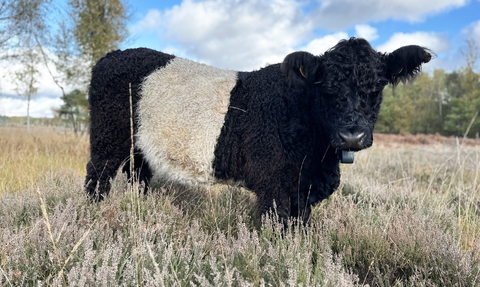Help our amazing grazing heroes this winter
Jon Hawkins
Every spring, summer and autumn, Surrey Wildlife Trust and other landowners including Surrey County Council and members of the farming community use carefully-managed herds of cattle and sheep to maintain sites across the county – including Chobham Common, Barossa Common, Thundry Meadows and Quarry Hangers – in a way that works for nature.
By munching on dominant grasses and scrub that could otherwise smother the delicate mix of wildflowers and other flora that supports a huge number of species, Surrey Wildlife Trust’s 250 bi-coloured Belted Galloway cattle and 70 sheep help species including Nightjars, Dartford Warblers, Silver-studded Blue butterflies, Sand Lizards and a multitude of pollinating bees and beetles as well as plant life including orchid species and Cut-leaved Germander.
Able to easily traverse steep and boggy areas inaccessible to vehicles, nimble-footed herbivores are much more effective than people or machinery at maintaining the right balance of vegetation, keeping habitats in tip-top condition and more resilient without disturbing wildlife or churning up the landscape. In an echo of the actions of wild large herbivores that used to roam the landscape, the animals also help create bare ground and indentations that benefit amphibians, insects and plants.
But with costs for overwintering, feed and veterinary care rising, additional funding is urgently needed to maintain the Trust’s herd and to expand conservation grazing to other areas across Surrey.
Surrey Wildlife Trust also wants to increase the use of 'no fence' grazing, which uses specialized GPS collars, controlled using an app. This makes costly fencing unnecessary and enables herds to be moved to new grazing territory safely, quickly and easily.
SWT Director of Reserves Management James Herd says:
“Our grazing superheroes can do things human conservationists simply can’t – and as a result people in Surrey can enjoy some of the most beautiful but threatened landscapes in the UK. And with nature under increasing pressure across the board, that is priceless.
“But although conservation grazing is cost effective compared to other methods, that doesn’t mean it comes cheap. Feed and overwintering are increasingly costly. Our grazing team works tirelessly to keep our animals fed, watered, trained and in top condition – and we need to recruit more volunteers to help them. And to make the biggest possible impact on Surrey’s landscapes, we need to expand our no-fence grazing operation and share what we achieve and learn with other organisations involved in conservation grazing across the county and nationally.
“If you are able to, please support us. By donating to our appeal, you can be a hero too.”
Alongside maintaining SWT’s existing grazing operation, the fundraising campaign has four aims, designed to benefit landscapes across the county:
- Expanding 'no fence' grazing in Surrey. Equipping more conservation grazing cattle with GPS collars will reduce the need for physical fences (thus reducing the costs of installation and maintenance) and allow more targeted grazing. This technology will allow the herd’s location to be tracked, making welfare checks easier, ensuring their safety and provide data to monitor the ecological outcomes of the livestocks actions.
- Increase awareness of conservation grazing and engage with local communities to ensure that people, dogs and grazing animals can safely enjoy local reserves. The Trust will share this information with other organisations locally and nationally.
- Increasing the Trust’s conservation grazing team capacity by recruiting and training more volunteer ‘lookerers’. To ensure the day-to-day welfare of the grazing herds, we aim to have 15-20 weekend volunteer lookerers.
- Breeding a flock of cross-breed sheep (combining traditional Wiltshire Horn and Boreray breeds) with wool-shedding qualities, resulting in improved welfare and low cost. These cross-breed sheep do not require time-consuming and costly shearing and are less likely to suffer from fly strike or getting caught in scrub. They could be a vital resource for land managers and conservationists across the county and beyond.
What it costs:
- £25 pays for an animal to graze a site for a week
- £75 pays the vet and welfare bills for a cow for a year
- £300 pays for a ‘Nofence’ GPS collar
- £500 sets up a grazing compartment with electric fencing in locations where No-fence grazing isn’t currently viable.

© Surrey Wildlife Trust
